Professor Paul Roberts from the University of Nottingham School of Law (UK) is a famous British criminal evidence expert, also a member of the Advisory Committee of Foreign Experts in Institute of Evidence Law and Forensic Science, CUPL, an overseas researcher of China Collaborative Innovation Center of Judicial Civilization (CICJC, China), an overseas key member of the “111 Plan” Base for Evidence Science Innovation and Talent Recruitment and member of International evidence science association. He studied law at the University of Oxford and Cambridge University in England. He was hired as a professor since 2003. The course he has taught include Criminal Justice, Evidence Law, Criminology, Criminal Law and Forensic Science Theory. His representative publications listed as follows: Roberts and Zuckerman, Criminal Evidence (OUP, 2/e 2010), Roberts and Hunter (eds), Criminal Evidence and Human Rights (Hart, 2012), Aitken, Roberts and Jackson, Fundamentals of Probability and Statistical Evidence in Criminal Proceedings (Royal Statistical Society, 2010), Roberts and Redmayne (eds), Innovations in Evidence and Proof (Hart, 2007). Moreover, Prof. Paul Roberts has published more than 80 academic papers, book chapters, essays and comments.
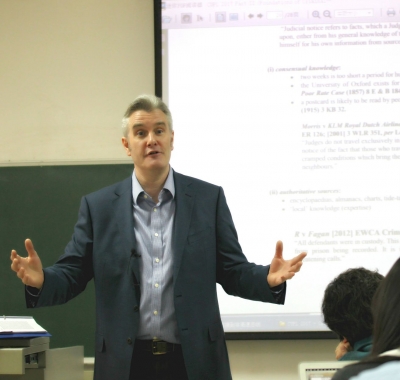
Prof. Roberts had been invited as part-time or visiting professor to give lectures at the University of Warsaw (Poland), University of Gottingen (Germany), University of New South Wales and Sydney (Australia) and University of Hong Kong. He is an editor of four international academic journals: “International Commentary on Evidence, Criminal Law & Philosophy, Law, Probability and Risk (SSCI) and Law and Philosophy (SSCI). In addition, professor Roberts is one of the founding members of the editorial board of the International Journal of Evidence and Proof, and served as editor in chief in the period of 2005-2009. Invited by the institute of Evidence Law and Forensic Science, CUPL, prof. Paul Roberts give lectures on topic of English Criminal Evidence in Comparative Perspective every year in CUPL since 2013.
I. Professor Paul Roberts delivered a course on topic of Criminal Evidence, Forensic Science & Expert Witness Testimony: An English Common Law Perspective
Invited by China Collaborative Innovation Center of Judicial Civilization, the “111 Plan” Base for Evidence Science Innovation and Talent Recruitment, and the Institute of Evidence Law and Forensic Science, CUPL, Prof. Paul Roberts successfully delivered an interesting and thought-provoking lecture on topic of “Criminal Evidence, Forensic Science & Expert Witness Testimony: An English Common Law Perspective” for CUPL graduate students. This course started from 4 March for 10 days. During the course, Prof. Roberts provided students a wide range of reading materials and specific teaching plan. Students were encouraged to make an active speech and think critically after case-study and discussions.
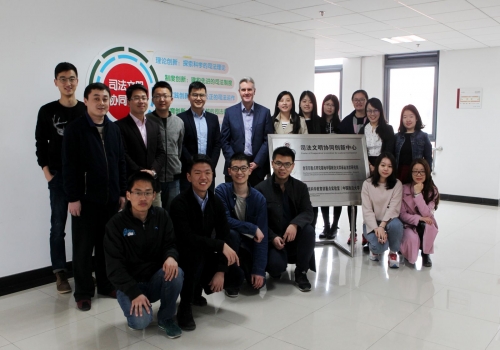
The course, consisting of nine lectures, is split into four principal parts:
Part I: Comparative Methodology and Criminal Adjudication;
Part II: Foundational Concepts, Jurisprudential Method and Institutional Context of English Criminal Evidence;
Part III: Forensic Science, Expert Evidence and Criminal Justice: Institutional Contexts and Challenges;
Part IV: Expert Evidence in English Common Law.
Most of the content of this course is the latest research results of Prof. Paul Roberts, and also shown as teaching materials firstly.
Students who attended this course are from various background, including teachers, PhD students, graduate students with different majors from different schools, CUPL alumni and judges from the Supreme People’s Court of PRC. The course was taught in English and was highly praised by our students and teachers.
II. A senior seminar for foreign experts was jointly held by the Institute of Evidence Law and Forensic Science and the Institute of Procedural Law of CUPL: Professor Paul Roberts gave lecture on topic of Five Fundamental Fallacies of Common Law Evidence

On the morning of March 15, 2017, a senior seminar organized by the Institute of Evidence Law and Forensic Science and Institute of Procedural Law achieved great success at Haidian district campus of CUPL, Prof. Paul Roberts attended the seminar as guest speaker. The topic of the seminar is "Five Foundational Fallacies of Common Law Evidence". The seminar was moderated by Prof. Baosheng Zhang, Co-Chair of the “2011 Plan” – China Collaborative Innovation Center of Judicial Civilization, and Prof. Guangzhong Chen, tenured professor of CUPL, made an opening speech, then Prof. Bensen Li, Vice Dean of the Institute of Procedural Law made comments after the lecture. Prof. Jianhua Xiao from Institute of Procedural Law, Prof. Zhiyuan Guo and Associate Prof. Shanshan Zhao from School of Criminal Justice, Associate Prof. Danhong Wu, Associate Prof. Fumin Chu, Associate Prof. Hongqi Wu, Associate Prof. Zhuhao Wang, Lecturer Bing Li from the Institute of Evidence Law and Forensic Science, Associate Prof. Wei Pei from the Law School of Beihang University, Associate Prof. Bo Yin from Beijing Normal University, as well as undergraduate, graduate and PhD students majored in Evidence Law, Litigation Law and other relevant disciplines from CUPL and other domestic universities attended the seminar. Li Beifang, a third-grade J.D. candidate from the Indiana University - Bloomington Maurer School of Law (USA) served as simultaneous interpreter.
Firstly, Prof. Guangzhong Chen delivered a warm welcome to Prof. Roberts, and gave a detailed review about the experience of studying criminal proceedings in Britain many years ago, emphasizing that the common law evidence has strong reference value to China's judicial reform.
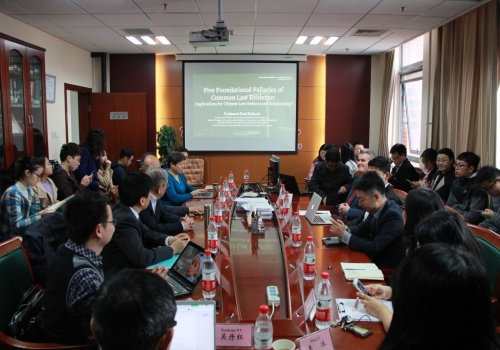
In the first part of the seminar, Prof. Roberts emphasized on what is evidence law under the common-law perspective, pointing out the sources of evidence law in common law system, including case law, legislation, systematic codifications, treatises and textbooks. However, when mentioned by common-law country lawyers, they usually refer it to the statute, i.e. the old case law before codification. At present, there are more than 100 different common law systems all over the world, and each of them is unique in the development trend of convergence and variation. Therefore, common law is merely a highly generalized judicial model.
In the second part, Prof. Roberts explained the five fallacies specifically, which are usually regarded as the characteristics of the common law of evidence. The first fallacy is that “Evidence law is considered as a unified and generic one with no difference between civil procedure and criminal procedure.” Prof. Roberts claimed that evidence rules in civil procedure are different from ones in criminal procedure, and very few of them share the same evidence rules. The second fallacy is that “Evidence law only focuses on fact-finding.” Prof. Roberts stated that, the overriding objective of evidence law is that cases be dealt with justly, meanwhile committed to fact-finding. The third fallacy is “Evidence law is a distinguishable subpart of procedural law.” On the contrary, Prof. Roberts said that the evidence law should be researched under the context of the complete criminal procedure, such as the evidence collection in criminal investigation. Therefore, scholars should regard criminal evidence rules as a complete system, rather than limited in the process of trial. The forth fallacy is “Evidence law is only the instrumental servant and subsidiary of substantive law.” Prof. Roberts believes that the evidence law is the foundation of the rule of law, rather than the “accessory” of procedural law. Facts are anterior to rights and obligations, and therefore more fundamental. The fifth fallacy is that "both participants in a lawsuit could be treated equally under common law system. However, Prof. Roberts mentioned that the logical outset of criminal evidence law is unequal in the first place, resulting in the biased application of the evidence rules to litigating parties.
In the third part, considering the five fallacies mentioned above, Prof. Roberts clarified the implications for the reform of the evidence law in China in academic research and judicial reform. Prof. Roberts expected that China would learn the concepts of advanced evidence law, and the reconstruction of evidence law should be properly contextualized in the meantime. He believed that the evidence law would be with Chinese characteristics in the future.
During the part of commenting, Prof. Bensen Li gave detailed comments on Prof. Roberts’ lecture, and said that the lecture was highly instructive for evidence law. Finally, Prof. Baosheng Zhang spoke highly of Prof. Roberts’ lecture and delivered his gratitude to Prof. Roberts for his high-level academic visiting in CUPL during these years. This seminar with wonderful content, strong academic atmosphere and enlightening inspiration, has achieved great success.
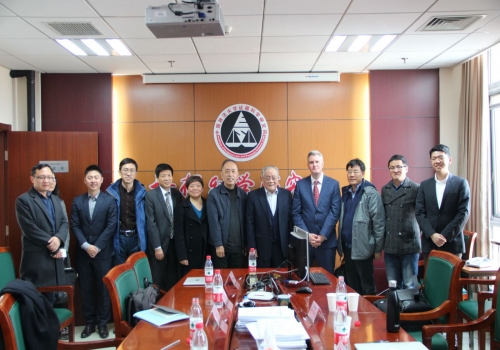
III. Professor Paul Roberts visited Fada Institute of Forensic Medicine & Science and delivered a presentation on topic of Is Forensic Science Fit for Justice?
on the morning of March 16, 2017, invited by Prof. Xu Wang (the Dean of Institute of Evidence Law and Forensic Science, CUPL and Director of Fada Institute of Forensic Medicine & Science) , and accompanied by Associate Prof. Zhuhao Wang (Director of Office of International Cooperation and Exchanges, Institute of Evidence Law and Forensic Science, CUPL) , Prof. Paul Roberts visited Fada Institute of Forensic Medicine & Science, where he gave an academic presentation on the topic of Is Forensic Science Fit for Justice? Participants of the meeting were Prof. Dong Zhao (Director of Teaching and Research Section, Fada Institute of Forensic Medicine & Science), Prof. Hongxia Hao (Associate Director of Teaching and Research Section, Fada Institute of Forensic Medicine & Science) , Prof. Di Lu, Prof. Jinian Hu, Lecturer Bing Li and Lecturer Yuanyuan Lian, etc.
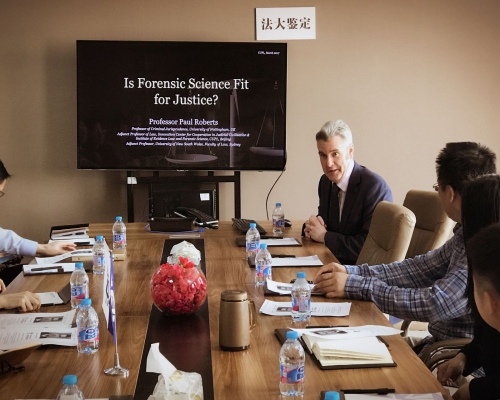
In his presentation, Prof. Roberts listed twenty issues that should be emphasized by scholars in the fields of evidence law and forensic science. Experts attended the seminar discussed the issue of evidence interpretation and admissibility from the perspective of law as well as forensic science in details. Prof. Dong Zhao introduced Fada Institute of Forensic Medicine & Science through a short video, and after the seminar, he showed Prof. Roberts around the laboratories and the forensic science museum of Fada Institute of Forensic Medicine & Science. The visit of Prof. Roberts is of great significance. For one thing, experts of Fada Institute of Forensic Medicine & Science have had a basic understanding of the status quo of scientific evidence in the field of England and Wales law. Furthermore, we should keep a good interaction and communication between experts in the field of forensic science and evidence law to improve the development of evidence and forensic science.
IV. Professor Paul Roberts published SSCI and SCI articles in top scholarly journals with title of member of "2011 Plan" China Collaborative Innovation Center of Judicial Civilization (CUPL)
In July 2016, Prof. Paul Roberts, an adjunct professor in “2011 Plan” China Collaborative Innovation Center of Judicial Civilization, a professor in University of Nottingham School of Law (UK) as well as a famous evidence jurist of UK, published his paper Redmayne’s Character and Criminal Jurisprudence on Modern Law Review, a top scholarly law journal in UK. "2011 Plan" China Collaborative Innovation Center of Judicial Civilization(CUPL) was included in the column of author affiliation.
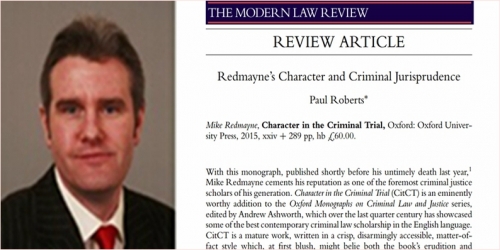
Modern Law Review is recognized as the top law academic journals in the UK. It was founded in 1937 and has a long history. It has traditionally maintained close academic ties with the Law Department of the London School of Economics and Political Science (LSE). The Modern Law Review has been identified as the "pre-eminent United Kingdom law journal" in a ranking based on statistical data from the 2001 Research Assessment Exercise and enjoyed great academic reputation worldwide. In this paper, on behalf of scholars in the field of evidence law in UK, Paul Roberts remembers LSE Prof. Mike Redmayne, the leading pioneer of British evidence law, who died tragically young in 2015. Additionally, Prof. Paul Roberts demonstrates and summarizes Redmayne’s typical academic viewpoints.
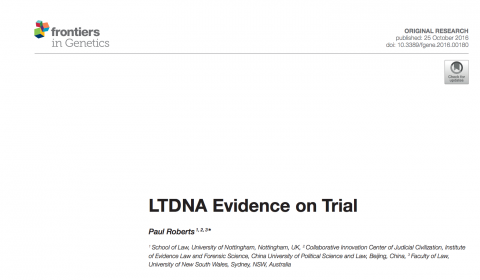
In October 2016, Prof. Paul Roberts published his paper LTDNA Evidence on Trial in Frontiers in Genetics, a famous Journal of Natural Science. "2011 Plan" China Collaborative Innovation Center of Judicial Civilization was also in the column of author affiliation.
Postscript
Since prof. Paul Roberts’ first visit to CUPL — a two-week academic visiting in 2017, it has been ten years of exchanges and cooperation between us. During this period, we have known each other more. From a single academic title to an academic seminar and prof. Roberts’ evidence law course every year, then the seminar attended by domestic peer experts with specific topics and discussions with prof. Roberts, and now teachers and students at CUPL has prepared to visit the University of Nottingham. Furthermore, Prof. Roberts published his paper Redmayne’s Character and Criminal Jurisprudence in the title of adjunct professor of law in China Collaborative Innovation Center of Judicial Civilization (CUPL) on a top scholarly law journal in UK. The cooperation between us has become more deeply and diversified. Through the visiting and cooperation, we also gained precious friendship and trust. We are looking forward to creating more achievements with prof. Roberts in a broader academic world in next ten years.